Kudlich, Hans (1823-1917)
Liberator of the peasants in lower Austria
 Hans Kudlich was born on October 25, 1823 in Lobenstein, Austria-Schlesia. He was the third son of eight children. His parents were wealthy, but 'serf-taxed' ("robotpflichtige") farmers. His father had an important roll in the village, Lobenstein, where they lived. He was the speaker for the farmers against the rulers.
Hans Kudlich was born on October 25, 1823 in Lobenstein, Austria-Schlesia. He was the third son of eight children. His parents were wealthy, but 'serf-taxed' ("robotpflichtige") farmers. His father had an important roll in the village, Lobenstein, where they lived. He was the speaker for the farmers against the rulers.
At 11 years of age Hans Kudlich attended the "Troppauer Gymnasium" (an academic high school). Thereby he didn't have to take part in the "slavery of the 14 year olds' military service". The university prepared in every way a way out for him into social freedom. At 17 years of age he received his certificate of matriculation and could study with the permission of the rulers of Liechtenstein in Wien philosophy and later law. Here the bright farmer's son was able to join liberal circles like the "Wiener Leseverein" very quickly through his older brother Hermann and other people coming from his homeland in Schlesia. This was the meeting point of the liberal pre-revolutionary intelligence including factory owners, merchants, and lawyers.
On March 13, 1848 Hans Kudlich took part in the famous demonstration before the lower Austrian townhall ("Landhaus"). (Today a commemorative tablet stands in his memory in its courtyard.) It was the beginning of the March-Revolution and initiative ignition for further mob revolts in Germany. Because Kudlich's right hand was severely hurt by a bayonet of the military at the bisbandment of the demonstration, he became a martyr for freedom. He left Wien and went home so his mother could nurse him back to health again.
At home barely healthy again, Hans Kudlich let himself be nominated as a candidate for the "Reichstag" in Wien. On July 24, 1848 he was elected as the youngest delegate in the "Reichstag". This was the first free elected Parliament of the Donau monarchy. Immediately on the next day he proposed a bill to free the peasants from the last vestiges of serfdom. This bill ended up bestowing the title of "liberator of the peasants" on him. The proposal read: 'The high Reichsassembly may declare: from now on the serfdom relationship with all of its rights and obligations is to be abolished subject to the provisions, if and how a compensation is to be rendered.' Thereupon a vehement debate took place as to who should pay the commensations. Even if Kudlich couldn't get all the serfdom vestiges discharged, the bill was nevertheless a success and a big step forward. It actually brought about the liberation of the peasants and changed their status from ruled subjects to equal citizens. On September 7, 1848 a delegate form of Kudlich's liberation porposal was proclaimed and on September 9,1848 sanctioned by Emperor Ferdinand I.
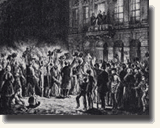 Consequently 30,000 peasants induced a torch-light procession in honor of Kudlich on the 24th of September, 1848. (This was the first but unfortunately also the last festival for them.) By commission Emperor Franz Joseph I made the law practical and realizable on March 4, 1849. It remains the first and only reform work that the Reichstag in Wien had resolved and that continued to exist in the long run.
Consequently 30,000 peasants induced a torch-light procession in honor of Kudlich on the 24th of September, 1848. (This was the first but unfortunately also the last festival for them.) By commission Emperor Franz Joseph I made the law practical and realizable on March 4, 1849. It remains the first and only reform work that the Reichstag in Wien had resolved and that continued to exist in the long run.
Already one month after the law was passed, liberating the peasants on September 7, 1848, the October Rebellion broke out in Wien. The October Rebellion eventually led to the collapse of the Revolution, to the moving of the "Reichstag" to Kresmier, and finally to the violent disbandment of the "Reichstag" on March 7, 1849. Kudlich thought to mobilize the peasants for whom he had worked and fought in the "Reichstag", but they had already reached their goal, their freedom. The Revolution was therefore over for them.
Kudlich had to flee to Kresmier like most of the Austrian democratic left delegates. First he went to his brother Josef Hermann in Frankfurt on the Main and eventually on to Leipzig. There he actively took part in the "Pfalz" rising and became a member of the provisional rebellion government. Then after their suppression, he fled to Switzerland. After that he was in absence sentenced to death twice. First on October 31, 1851 by the accusation board of the Pfalz in Saarbruecken and on March 10, 1854 by the courts of the country in Wien.
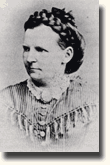 In Bern he was taken in into the home of the liberal professor, Wilhelm Vogt, leader of the medical clinic. Here he then changed his educational goals and studied medicine in Bern und Zuerich. He had always had an interest in medicine, but had studied law to please his father. In March of 1853 he took the exams for his doctor's degree and in the same month also married Professor Vogt's daughter, Luise. On the target-date, April 4, 1853, he with his young bride left Switzerland as an exile. The authorities could only protect him until the completion of his exams, after that he had to leave the country. They went by sailboat to New York and he paid for the trip by working as the ship's doctor.
In Bern he was taken in into the home of the liberal professor, Wilhelm Vogt, leader of the medical clinic. Here he then changed his educational goals and studied medicine in Bern und Zuerich. He had always had an interest in medicine, but had studied law to please his father. In March of 1853 he took the exams for his doctor's degree and in the same month also married Professor Vogt's daughter, Luise. On the target-date, April 4, 1853, he with his young bride left Switzerland as an exile. The authorities could only protect him until the completion of his exams, after that he had to leave the country. They went by sailboat to New York and he paid for the trip by working as the ship's doctor.
A new epoch started for him. He literally set foot on a 'new world' like so many of the "Forty-eighters". After an unsuccessful start in Greenpoint, New Jersey, he moved to Hoboken near New York in 1854. In this city many Germans lived at that time and here he became a very successful physician. His exceptionally happy marriage with Luise Vogt also brought forth 9 children. Soon he developed into a leading personage of the German character in the city of Hoboken and all of New Jersey. He helped establish many German clubs (for example the "Deutschen Klubs fuer Kunst, Wissenschaft and Geselligkeit") and schools. Especially worth mentioning would be the ''Hoboken-Academie", one of the best German-American schools of his time.
In the American Civil War (1861-1865) he passionately supported Abraham Lincoln because he had already once fought for the freedom of the oppressed. After one of his lectures, he was asked whether he would be willing to have his daughter marry a Negro. His reply was, "Certainly, provided the Negro were a decent person."
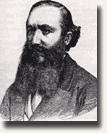 When 1867 his death-warrant in Austria was retracted, he with his wife and their 9 children visited Austria in1872 for the first time again. Even though he was greeted with much enthusiasm, he soon discovered that he'd become a stranger to the Austrian politics in the meantime. He could not see much difference in the country now from the old regime. Thus he wrote from his notes in the winter of 1872-73 in Lobenstein his "Rueckblicke und Errinerungen" in three volumes and then 1873 returned to the United States.
When 1867 his death-warrant in Austria was retracted, he with his wife and their 9 children visited Austria in1872 for the first time again. Even though he was greeted with much enthusiasm, he soon discovered that he'd become a stranger to the Austrian politics in the meantime. He could not see much difference in the country now from the old regime. Thus he wrote from his notes in the winter of 1872-73 in Lobenstein his "Rueckblicke und Errinerungen" in three volumes and then 1873 returned to the United States.
Even in his later years he followed the political developments in Austria and Germany and often visited his Austrian and "sudetendeutsches" homeland. He could never though decide to stay there because he had probably tasted the 'air of freedom' in the United States for too long.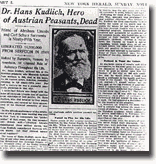
Hans Kudlich suddenly died on November 11, 1917 at the age of 94 in Hoboken, U.S.A. He was physically fit and mentally of sound mind at the time of his death. The once youngest was now also the last living of the 383 delegates of the first Austrian "Reichstag". His urn and that of his wife were then festively put into the urn-hall of the Hans-Kudlich-Watch-Tower in Lobenstein in October of 1925.
Hans Kudlich was and is honored in many a way today yet. Many memorials and commemorative articles remind us of him. Some even honored him while he was still alive: on September 21, 1913 the Hans-Kudlich-Watch-Tower was inaugurated. Even novels, plays, and works by sculptors and painters remind us of his accomplishment. Joerg Kudlich, his great-nephew, and the "Sudetendeutsche Archiv" in Munich have even prepared a synopsis of his memorials.
Reforms aren't a luxury! Consistent social reforms and innovations were and are today also guarantees for a secure present and future. The Austrian liberation of the peasants in 1848 contributed substantially to our universal history. Thus Hans Kudlich can be a special symbolic figure for every generation. The statement, "The free man alone can be the guardian of freedom and that is why you must free the peasants.", that Hans Kudlich spoke on August 8, 1848 in the "Reichstag" in Wien, can be valid for us today yet.
Additional pictures: (Source: the book "Hans Kudlich und die Bauernbefreiung in Niederoesterreich")
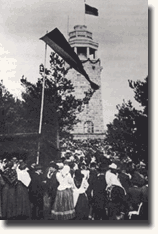
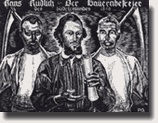
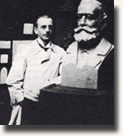
German Version